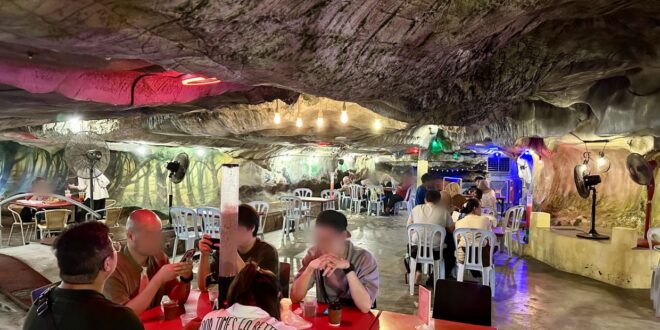AN eviction notice is to be issued to a food court proprietor running a business inside a 400-million-year-old limestone cave in Gombak, Selangor.
Gombak District and Land Office (PDTG) director Nor Azlina Abdul Aziz said the decision was made following an investigation at the Gua Lepak food court.
She confirmed that the food court was located on Selangor government land.
An eviction notice, Nor Azlina said, would be issued under Section 425 of the National Land Code 1965.
“The cave and its surroundings are gazetted as Batu Caves reserve.
“PDTG can confirm that the operator has never applied for permission from any local authority (PDTG or Selayang Municipal Council) to carry out activities there.
“No approval or permission was given to the operator to occupy and carry out activities at the site,” said Nor Azlina.
She added that Section 425 addresses the unlawful occupation on state, reserved or mining land.
It stipulates that any person without lawful authority occupying or erecting a building, clearing, ploughing, digging or cultivating on state, reserved or mining land commits an offence.
Violators could face a fine not exceeding RM500,000 or imprisonment for a term not exceeding five years, or both.
The individual had been operating the food court at the cave since last March.
The encroachment issue was highlighted by StarMetro in a front-page report on March 11 titled “Food court in Gombak cave stirs up concerns”.
Since Monday, many parties have expressed concern over the encroachment as it can jeopardise Selangor’s bid for it to be recognised as a Unesco Global Geopark.
The Department of Minerals and Geosciences Malaysia (JMG) confirmed that it did not receive any application from the operators or local council for any proposed activities to be carried out in the cave.
Minerals and Geosciences director-general Datuk Zamri Ramli said the department was not consulted to review the technical aspects of proposed business activities or any activities being carried out in the cave.
“According to procedures, applicants must submit proposals to the local authority,” he said in a press statement.“The local authority must request technical reviews for such proposal from JMG, which is one of the state technical agencies.” He added that any proposed development taking place in or within a limestone hill must be based on JMG’s “Guideline for Determination of Hazard Zone at Limestone Area” for determination of safety zones.
Zamri said the media had raised concerns several times about the Gua Lepak food court operating in the limestone cave, also known as Swamp Cave.
Among the issues raised, he said, concerned visitors’ safety, risk of geological disasters, conservation of fossils on-site, legitimacy of the restaurant’s operations, vandalism risks, disruption of endemic biodiversity as well as preservation and sustainability issues related to the geosite, which is part of the Gombak-Hulu Langat Geopark (GHL Geopark).
“In the context of the geopark development, community well-being and generating local economic activities are essential elements adding value to a geopark.
“However, this value-added activity must align with the concept of geopark development, which involves three key elements – conservation, education and sustainable development.
“The JMG strongly recommends that the National Geopark Development Plan 2021-2030 and National Geopark Implementation Plan, decided upon for adoption at the 42nd National Physical Planning Council Meeting, be used for every geopark development,” he added.
When contacted, planning expert Derek Fernandez said further steps could be taken to list the cave area as a national heritage site under the National Heritage Act 2005 (Act 645) to impose restrictions.
“In addition to this, the local authority can include the cave area in its local plan for its protection,” he said.
 BeritaKini.biz Berita Viral Terkini di Malaysia
BeritaKini.biz Berita Viral Terkini di Malaysia





